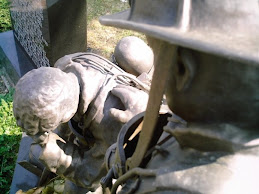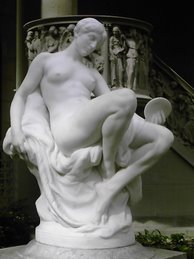 "America is the land of the uncommon man. It is the land where man is free to develop his genius – and to get its just rewards.” ~ Ayn Rand
"America is the land of the uncommon man. It is the land where man is free to develop his genius – and to get its just rewards.” ~ Ayn RandBy Joseph Kellard
As Independence Day nears and as debates over immigration rage on, I’m reminded of how an atheist émigré from communist Russia taught me what it means to be an American patriot.
Ayn Rand, author of Atlas Shrugged and The Fountainhead, once wrote: “The United States of America is the greatest, the noblest and, in its original founding principles, the only moral country in the history of the world.”
Rand’s books all evoke this glorification of America. When I first encountered them, though, I was a left-wing ideologue who questioned whether she knew that ours was a racist society that had stolen its land from the Indians, enslaved blacks and exploited the poor. Yet, despite that I believed those claims, a prideful lump always swelled in my throat whenever I heard our national anthem.
Looking back, I realize that I at least suspected there was much more to America than these charges of theft, racism and exploitation. For this reason, Rand’s uncompromising praise of our nation struck a chord with me, and I felt compelled to consider and investigate her justification for it.
Unlike conservatives who attributed America’s greatness to its being “God’s chosen country,” Rand showed that the United States was the result and crowning achievement of the Enlightenment, the 18th century intellectual movement that championed reason and challenged religion’s dogma and pervasive influence. Our Founding Father’s explicit respect for reason, Rand noted, lead them to create an unprecedented nation, founded on the philosophical principle that each individual has an inalienable right to his own life, liberty and pursuit of happiness. And this moral and political foundation of individual rights, Rand recognized, was what distinguished America from all nations, past and present.
America’s Founders intended our nation to be one in which each individual has a right to think for himself and pursue his independent values as he sees fit, while simultaneously respecting that right in others. In America, as our Founders intended, no authority, whether a god, tribal chief, king, pope or bureaucrat, would dictate the course of any individual’s life; he would live for himself, “neither sacrificing himself to others nor sacrificing others to himself,” Rand wrote.
This new nation would prove to be vastly different from the monarchies, oligarchies and theocracies of the past. Indeed, as Rand demonstrated, its foundation in individual rights (and the corresponding politico-economic system, capitalism) caused America to emerge as a nation of free-thinking, productive individuals, a land of scientists, inventors, entrepreneurs and businessmen who made possible an array of labor- and time-saving advances that dramatically increased prosperity and quality of life.
In short, Rand showed that at the root of America’s founding and prosperity is the principle of individual rights.
Related to this, she taught me that one should evaluate our Founders (and historical figures in general), not on the basis of how they were like their predecessors and contemporaries, but on the basis of how they fundamentally distinguished themselves. I came to see that our Founders represented a unique bridge between the irrationalities and injustices of the old world and the much greater heights still open to this nation.
Although some founders owned slaves, it is crucial to note that some form of slavery existed in virtually all pre-American societies. What’s most significant about Thomas Jefferson and George Washington is not that they too owned slaves, but that they were the first in history to uphold individual rights that are universal to all men, and thereby laid the moral and political foundation for slavery’s eventual abolition.
Rand also understood that racism could not be the cause of America’s unprecedented power and prosperity, noting that insofar as debilitating racism existed in America, it was not so much in the freer, capitalist, industrial North as it was in the agrarian, almost feudal South. Nor was America’s alleged exploitation of the Indians the cause of her power and prosperity.
Whereas others have painted America as a backward, tribalist society, Rand showed that these characteristics better described the societies of the original Indians, and contested the claim that they had a “right” to this land: “If a ‘country’ does not protect rights, if a group of tribesmen are the slaves of the tribal chief, why should you respect the ‘rights’ that they don’t have or respect?” she once asked rhetorically.
That which America enjoys today, Rand showed, was not taken from the slaves or Indians, but was created here by her free inhabitants.
On some level, America’s immigrants have always recognized these facts about America. They have not arrived on our shores expecting to be enslaved and exploited: They have come here expecting to live freely and prosperously.
Perhaps this was why Rand was in a position to identify what’s great about America. She defected from the Soviet slave state, where millions of innocents were slaughtered based on such communist ideals as self-sacrifice, equality of results and an all-powerful state that dictated how individuals must think and live. Rand knew that in America she would be free to think independently and to write and profit from books that offered trailblazing, challenging ideas, perhaps best exemplified by the provocatively titled The Virtue of Selfishness.
In fact, although it is beyond the scope of this piece to demonstrate it, Rand’s books provide the philosophical foundation on which America can properly complete and ground its revolutionary principles and reach infinitely greater, unimagined heights.
So what does it mean to mean to be an American patriot? As I learned from both the examples and writings of a Russian immigrant, it means that one acknowledges, cherishes and advocates that which is truly unique about this nation, its foundation in each individual’s moral and political right to live his life free of coercion in the pursuit of his own selfish values and happiness.
* I would like thank Alan Germani for providing valuable comments to improve an earlier version of this op-ed.































+-+June+2009.jpg)











3 comments:
It also means you don't gotta be an American to be a patriot- just a defender of the right to live free
Americans by choice are wonderful discoveries. I have met people who escaped from the communists and been very moved. They understood freedom in a very personal way. Americans by choice are often heroic, vs. some idiot that has never been faced with any adversity in his personal life.
Really an excellent tribut to Ms. Rand. Thank you for writing this!
Post a Comment